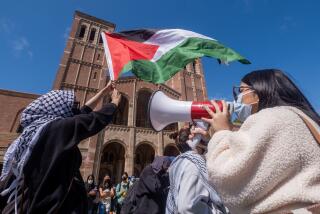For Them, War and Election Are Close to Home
- Share via
LEBANON, Pa. — Someday soon Shannon Lester’s boyfriend, a staff sergeant in the Army National Guard, will leave for Iraq. There will be a hasty wedding, a teary goodbye and some financial belt-tightening for the couple already struggling to support the five children they’re raising together.
The 29-year-old homemaker’s voice strains with stress when she talks about the war. At a recent community picnic at the National Guard armory here, she questioned the Bush administration’s choice to “police the whole world” and wondered if it was time to “get the hell out” of Iraq.
But Lester, who voted for George W. Bush in 2000, said she was supporting him again.
For Lester and others with loved ones in the Guard or the reserves, the outcome of the presidential election is more than a matter of partisan interest. The winner could determine where, when and for how long these soldiers will fight.
Guard members and reservists are being called up at a pace not seen since World War II. About 170,000 Guard members and reservists are on active duty, and the National Guard makes up nearly 40% of the forces in Iraq and Afghanistan.
A Times analysis of Pentagon records showed that Guard members came disproportionately from small towns and rural counties -- places that were Bush country in 2000. Democrats have been hoping that the burdens these part-time soldiers are bearing might make those who care for them open to a change in Washington.
But dozens of interviews with voters in the two Pennsylvania counties with the state’s heaviest concentration of Guard members -- Lebanon and Clinton -- showed that the Democratic candidate faced more challenges than opportunities.
Discontent is evident among some, such as Gale Spangler, who voted for Bush in 2000. Spangler, whose son, Ron, was deployed for 15 months, said she felt misled by the administration.
The length of deployment, typically 14 to 18 months, is often a shock to many soldiers’ relatives, who were accustomed to seeing loved ones leave for weekends -- not months -- at a time.
“[Ron] was there for such a long time, and so many soldiers were getting killed,” said Spangler, who now volunteers for Sen. John F. Kerry’s presidential campaign. “I just kept thinking, ‘Why did we do this? If there were no weapons of mass destruction, why didn’t we know?’ ”
But for most of the Guard and reserve families interviewed, such frustrations paled when compared with the uncertainties they felt about Kerry’s plan for Iraq, skepticism about the media’s portrayal of the conflict, and a sense that the best way to support their loved ones serving abroad was to stay the course.
“We’re afraid that if Kerry becomes president, they’re going to pull the troops out,” said Stacey Clemente, the wife of a reservist. “And everything that has been done -- all the sacrifices, all the progress made, all the work that’s been done -- will be in vain.”
Shannon Lester’s boyfriend, Richard Snyder, joined the military four days after his high school graduation. His sprint to the recruiter’s office is well-trodden in this area, where blue-collar jobs are hard to find and the military offers a first step to college. It’s not unusual for 10% of the senior class at the local high school to join the military after graduation, although fewer have signed up since the Iraq war began.
“I wanted money for college and some adventure in my life,” said John Gates, a National Guardsman from the city of Lebanon who joined “when nothing was going on -- there wasn’t terrorism.”
Now, the visual reminders of what’s going on thousands of miles away are ubiquitous here and at nearby Ft. Indiantown Gap, the largest National Guard training center in Pennsylvania. All 2,000 Pennsylvania Guard members serving in Iraq have passed through the Gap on their way to war. There’s no shortage of yellow ribbons and American flags in the town to greet them.
In the interviews, voters in reliably Republican Lebanon County overwhelmingly named the war as their top concern. And they largely named Bush as the candidate they trusted.
Polls have showed that members of the military lean Republican, but data on their families’ political preferences are sparse. In April, a Washington Post/ABC poll found service members identified themselves as Republican by a ratio of 2 to 1, and families living on bases strongly supported the war and the president. Less is known about the political leanings of Guard and reserve families.
Many in Lebanon used words such as “duty,” “sacrifice,” “resolve” and “support” when asked about the war in Iraq.
“I think we have to support our president,” said Jen Trovinger, 37, who counted four friends, a nephew, an uncle and a cousin among those she knew in the Guard or regular military. “I think [the president] understands that he has a responsibility to defend this country against terrorists, and that’s what he doing.”
“We are quite capable of doing what the president has set out to do,” said Robert A. Anspach, mayor of Lebanon and a Bush supporter. “We need to be able to put a plan together and stick to it.”
Kerry’s protest against the Vietnam War after he returned from decorated service there has remained a fresh wound to many veterans here. For younger Guard members, his positions on gun control or abortion rights were the larger hurdle.
Gates, for instance, didn’t think Bush had done everything right. He said last week’s CIA report that found Iraq had no weapons of mass destruction before the invasion confirmed what he already thought.
But it won’t change his vote. “I don’t think Kerry is that great a guy -- I think he’s shaky.”
Rosemarie Cruz, a mother of three whose husband is leaving for Afghanistan with the Guard in January, also said the CIA’s findings had had no effect on her support for Bush. Iraqi leader Saddam Hussein was “still a threat. Who was to say that he was not going to come into the United States and try another 9/11?”
The spouses of many Guard members and reservists said they had stopped watching most television news, relying largely on Fox News Channel, military websites and e-mail from soldiers for information on the war. Asked if they were troubled by the violence in Iraq, they said they could not be certain the scenes they saw on television reflected the reality on the ground.
“The media seems to focus so much on the negative, and people believe it. The violent images don’t help; no one sees the good,” said Kelli Dreibelbis, a wife of a Guardsman.
Peter D. Feaver, a Duke University political scientist, said such skepticism presented a hurdle for Kerry, who has pointed to continuing U.S. fatalities and the beheading of hostages to illustrate his charge that the administration’s Iraq policies are failing.
“He’s running on a pessimistic message,” said Feaver. “And he risks coming across as pessimistic about American power.”
But Kerry’s attacks on the president have made inroads with some Guard families here.
“I supported this war in the beginning,” said one soldier’s wife, a 30-year-old registered Republican whose husband was in Iraq and who asked that her name not be used. “I think war should be a last alternative. I don’t think the president went through all his choices.”
She said in the past she voted Republican because so many of her friends in and around Lebanon were in the military, and she believed the party supported them. This year, she plans to vote for Kerry because she wants to send the president a message. “He has to know what he did is unacceptable. How else will he know?”
A few hours north, Gale Spangler, who welcomed her son, an Army reservist, home to Howard in April, was worried that her son’s time to serve might be coming -- again.
When her son Ron left for Iraq, Spangler said, she was a strong supporter of the war and Bush. But when his deployment stretched to a year and no weapons of mass destruction had been found, Spangler, a secretary at local college, changed her mind. “I just couldn’t understand it,” she said. “It was so frustrating.”
Howard is in Clinton County, one of the several rural areas that shifted from the Democratic to the Republican column in the 2000 presidential election. Al Gore lost the county by about 500 votes, and since then GOP registration has been on the rise. To win in November, experts said Kerry would probably need to win back voters in places like Clinton.
He will have to accomplish that without Cathy Stout, a Salvation Army captain in the county.
Her son, David, is a reservist in Iraq who calls her at work when he’s on Guard duty, partly to help himself stay awake. He tells her to vote for Bush, saying that if Kerry wins, things will be worse, not better, in Iraq.
But Stout isn’t completely sold. “I support the president, but at the same time it’s kind of mixed. I can’t understand some of his reasons for being [in Iraq]. There are so many places here in the U.S. that are in need,” she said.
But she and her husband, a Vietnam veteran, said they would vote Libertarian before they voted for Kerry. For them, the senator’s protests against the war in the Vietnam remain unforgivable.
More to Read
Get the L.A. Times Politics newsletter
Deeply reported insights into legislation, politics and policy from Sacramento, Washington and beyond. In your inbox twice per week.
You may occasionally receive promotional content from the Los Angeles Times.











